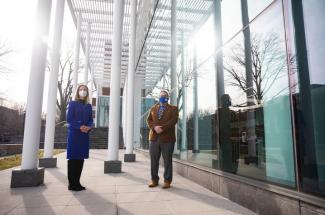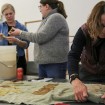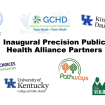Q&A: One Year of COVID-19 from Human Behavior & Epidemiology Perspectives

On March 6, Kentucky and UK HealthCare marked one year since the first patient tested positive for COVID-19. Since then, we have been through mask mandates, school and office closures and isolation from loved ones. We have suffered losses greater than we could have imagined, but we’ve learned to celebrate what is often taken for granted.
One year of COVID-19 has taught us a lot about the structure of our daily lives, and how changing that is a difficult feat. One year has allowed scientists to develop a vaccine that is rapidly being distributed, and that is working.
But where do we go from here? Will things ever be the same? UKNow sat down with University of Kentucky College of Public Health Dean Donna Arnett and Marc Kiviniemi, chair of the Department of Health, Behavior & Society in the College of Public Health, to get some answers on how COVID-19 will affect us moving forward.
How has the COVID-19 pandemic been different than other pandemics in the past?
“From an epidemiologist standpoint, COVID-19 is the most important pandemic since the Flu of 1918. I say most important because of the magnitude of the epidemic in terms of total number of cases and total number of deaths.
To put it in perspective, 55 million people died during the 1918 Flu pandemic, and we are at 2.5 million with COVID-19. We now have over 100 years of more sophisticated health care, better access and much more knowledge of medicine in general. I think COVID would have been the magnitude of the 1918 Flu, if not for our advancements in medicine.” – Dean Donna Arnett
“From a health and human behavior standpoint, COVID-19 doesn’t differ from the 1918 Flu nearly as much as it does from an epidemiologic standpoint. What we persistently see, even in news reports from the 1918 Flu, is that people are often very resistant to changing their behavior.
Even back then, people saw resistance with things like school and business closures. Today, there is clear resistance to mask-wearing and closures as well. There is this very persistent aspect of human nature, at least in the context of the United States, where individualism and working toward the collective good really butt heads. It really inhibits the ability to respond to a public health issue.” – Mark Kiviniemi
What has COVID-19 shown us about how we prepare for health care disasters?
“In America, we have had a state-by-state response rather than a federal response, and I think it definitely hurt us. It caused confusion with mask mandates and lockdown orders, and now we are seeing vaccine distribution mostly being handled this way too. We lacked a true federal response, and I hope we have learned from it.
From my perspective, it is now a national security issue. If a pathogen was released to our population purposely, not like accidentally with COVID-19, currently we do not have a response in place to combat it effectively. I hope in the post-COVID era that public health leaders will have a space to plan for the future. This way, it may not have to be a global pandemic again, but a much more manageable outbreak.” - Dean Donna Arnett
“Another important thing in terms of response is the disproportionate impact of COVID-19 on communities of color. We know that people of color are infected at a higher rate and die at a higher rate than their white counterparts. This then leads to vaccination rates being substantially lower in those communities as well.
In terms of response, there was no plan put in place to protect these communities, which contributes to the larger issue of medical mistrust in communities of color. Now that there is more research to show these disproportionate issues, we need to fold that into our future response plans.
COVID-19 has really highlighted that we need to have a public health infrastructure in place before things happen. You can’t detect the first case, and then put into place a system to do the detection.” – Marc Kiviniemi
What do we know about the post-COVID era? What do you anticipate will change about what we used to believe was normal?
“Right now, so many people are on this topic of herd immunity and when we will get it. It really is unclear scientifically when that will happen, because not enough people have been vaccinated yet. So right now, we are really focused on positive messaging surrounding the vaccine and encouraging people to get it.
I am 100% certain that ‘coronaviruses’ are here to stay. We will have to adapt vaccines every year, just like we have to do for the flu, to adapt to new variants that mutate over time. I think it’s going to permanently change how we work as a society.” – Dean Donna Arnett
“I don’t anticipate much to change. As I said earlier, it is very difficult to get people to change their behaviors, and so people will definitely return to the pre-pandemic way of life, in the absence of the government making a concerted effort to modify anything.
People are motivated to change their behavior when there is a reason to do so. In the case of COVID-19, people changed because there wasn’t really a choice. What I hope we can start to have a conversation about is what that modified level of life could look like, that would allow us to return to the positives of pre-COVID life, while still learning some lessons from the pandemic.” - Marc Kiviniemi


